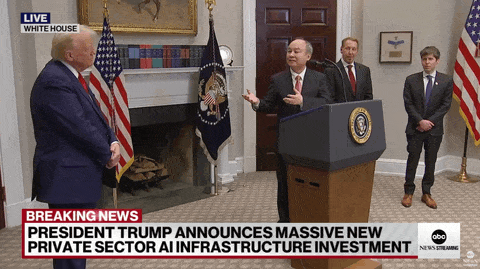
Hi Global Recap readers,
By now, you've probably heard whispers about some big "deals" the Trump administration has been striking with foreign nations and major corporations.
One of the largest? A massive $500 billion AI project dubbed Stargate.
Turns out, the deal might be falling apart behind the scenes, and most people don’t even know it’s happening.
In today’s deep dive, we break down how Stargate fits into a larger pattern of international investment deals with the US, and how these "deals" could be more smoke than fire.
Read about it today's deep dive. 👇
🌐 WORLD
Fast Scroll News

🇺🇦 Zelenskyy Signs Protested Law. Ukraine’s parliament passed a bill tightening control over key anti-corruption agencies, and despite thousands rallying in Kyiv and other cities on July 22 to demand a veto, President Zelenskyy signed it anyway.
The new law gives the prosecutor general more power over the National Anti-Corruption Bureau (NABU) and the Specialized Anti-Corruption Prosecutor’s Office (SAPO), which critics say will gut their independence.
EU officials and Transparency International slammed the move, warning it threatens Ukraine’s EU bid and trust with Western allies.
Protesters, many holding signs like “Veto the law” and “Stop robbing our future,” accused Zelenskyy of prioritizing loyalty over real reform.
One wounded war veteran put it bluntly: “Instead of setting an example of zero tolerance for corruption, the president is using his power to take control of criminal cases involving his allies.”
📌 Context: Ukraine’s fight against corruption is central to its hopes for EU membership and continued Western aid, especially during the ongoing war with Russia. This is the biggest public backlash against Zelenskyy’s government since the war began.

🇹🇼 China Backs Taiwan Opposition. China is openly rooting for Taiwan’s opposition as the island faces a mass recall vote targeting 24 Kuomintang (KMT) lawmakers this Saturday.
The KMT, which controls parliament but not the presidency, is accused by recall supporters of cozying up to Beijing and blocking defense spending.
Chinese officials and state media have blasted President Lai Ching-te, calling the recall a “political scheme” and labeling his government a “dictatorship.”
The KMT insists it doesn’t want China’s help, saying, “This is our business,” but Beijing’s loud support is making things awkward.
The recall campaign, led by civic groups and tycoon Robert Tsao, claims the KMT is “selling out Taiwan.”

🇷🇺 Russia Tightens Web Grip. Russia just passed a law letting authorities fine people up to 5,000 rubles (~$64) for searching or reading anything they label “extremist” online (even if you are using VPN). It is set to kick in September 1.
Even pro-Kremlin figures are spooked; one Russian MP called it the first time Russians could be punished for just accessing, not sharing, content.
Critics say the law’s vague wording could lead to fraud, blackmail, and a wave of self-censorship, with some already deleting apps and unsubscribing from channels.
The official blacklist is over 500 pages long, including groups like Navalny’s Anti-Corruption Fund, the “international LGBT movement,” and Meta (parent of WhatsApp and Facebook).
Mobile internet outages are spreading, officially blamed on drone threats, but some experts say it’s a dry run for locking down Russia’s internet.
🛸 Tinfoil? Mobile internet outages are spreading. They are officially blamed on drone threats, but some experts say it’s a dry run for locking down Russia’s internet.

🇺🇸 Trump Yanks US From UNESCO. Trump’s team just announced the US is ditching UNESCO again, barely two years after Biden got the country back in.
The official reason: UNESCO pushes “divisive” agendas and has sway anti-Israel since it admitted Palestine in 2011.
The move won’t kick in until December 2026, but it’s a blow to an agency famous for protecting global heritage sites like the Grand Canyon and the Taj Mahal.
UNESCO’s chief Audrey Azoulay says the US is wrong about anti-Israel bias and calls the exit “deeply” regrettable, but says they’re prepared.
This is part of Trump’s wider “America First” push, with the US already out of the World Health Organization and the top UN human rights body.
📌 Context: The US has a history of quitting UNESCO, first under Reagan in 1984, citing mismanagement and corruption to boost Soviet interests, and then again under Trump in 2018 and now.

🇯🇵 JAPAN
Under the Hood:
"Massive" Trade Deal
Trump just dropped a Truth Social post announcing the US has struck a “massive deal” with Japan—slashing tariffs from 25% to 15%.
His supporters are already spinning it as a masterclass in The Art of the Deal.
Critics are calling it TACO: Trump Always Chickens Out.
But I think there’s a deeper angle here.
Here’s what we know so far:
Context

Trump’s been dangling higher tariffs over Japan for months, but now it’s “just” 15 percent as part of a new trade agreement.
He’d threatened 24% back in April, then bumped it up to 25% in July, with an August 1 deadline to cut a deal and avoid even steeper tariffs.
Before Trump's second term, Japanese imports faced under 2 percent tariffs according to World Bank data.
Japan’s Relentless Lobbying
Japan’s negotiators have basically set up camp in DC, trying to soften the blow.
The lead negotiator has visited the US at least eight times.
Monday’s marathon meeting with Commerce Secretary Howard Lutnick clocked in at over two hours.
The $550 Billion Question
So now, here's the meat of the deal. Trump says Japan will pour $550 billion into the US, and that America will take home 90 percent of the profits. Sounds great on paper... but what does that actually mean?
He’s promising “Hundreds of Thousands of Jobs.”
But so far, there’s no detail on where that money’s going or how it’ll be used. But of course, this may change soon.
Japan’s Foreign Affairs Ministry hasn’t commented on it either.
Musk vs Stargate
Do you remember Project "Stargate"? It was a big deal back in January, promising to pump $500 billion over the next four years into new AI infrastructure for OpenAI in the US.
Backers included Japan’s SoftBank, OpenAI, Oracle, and MGX.
They even pledged $100 billion for "immediate investment," with SoftBank supposedly throwing in $30 billion upfront.
Trump supporters called it a massive win for him.
But the moment it dropped, Elon Musk called BS, and so did I.
Red Flags from the Start

I can’t remember if I said it here or privately, but the second I saw SoftBank’s Masayoshi Son on stage hyping the deal, I had doubts. Elon Musk seemed to feel the same.
Musk pointed out that SoftBank didn’t actually have the cash, with less than $10 billion secured.
The thing is, SoftBank’s funding problems, the losses from their Vision Fund, and Masa’s love for big promises weren’t exactly secrets back then.
But this didn’t stop critics from dismissing Musk as bitter or envious.
Turns out, he was onto something.
Fast Forward to Reality

Now it’s July 2025, and a new Wall Street Journal report reveals that the so-called $100 billion "immediate" investment has shrunk into... one data center in Ohio, maybe, by the end of the year.
SoftBank and OpenAI are reportedly butting heads over the where and how of the project.
Meanwhile, OpenAI's CEO Sam Altman is off making separate billion-dollar deals with Oracle and CoreWeave—leaving Masa out of the picture.
So the question is: Is this a fallout from clashing visions, or was the money never really there to begin with?
The Bigger Picture

Here’s my take. If you’ve been reading Global Recaps, you already know where I stand: many of these headline-hungry “deals,” where other countries make “pledges” are more smoke than signal. It’s not all of them, but definitely a whole lot.
Why would foreign governments or companies pour hundreds of billions into the US when they could just stall until Trump’s out of office?
They might toss in a few billion to save face, but there’s little incentive to go all in.
That was especially true back in January when the AI industry was dealing with chip export controls and tariffs. The whole sector was nervous, especially with TSMC in Taiwan being the key chip supplier.
So, was Stargate real? Or was it just a gesture to keep Trump happy while buying time? That’s been my working theory since it launched. I might be wrong, but we’ll find out how this plays out by the end of Trump’s final term.
Now, About That Japan Deal

Which brings us to the $550 billion trade deal with Japan that Trump’s been touting.
Just like Stargate, the $550 billion deal with Japan that Trump announced might end up in the same boat.
There’s still no real detail on this so-called investment (yet), which means this “deal” could just be a framework or a handshake between the two countries, with Japan not necessarily on the hook for anything concrete.



